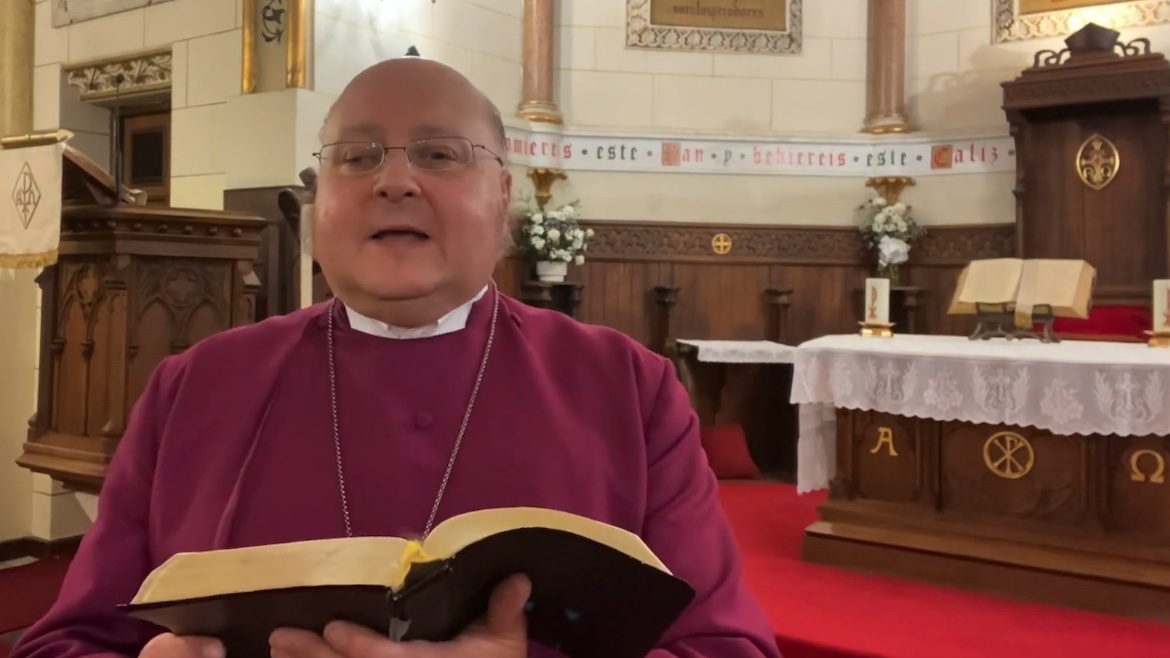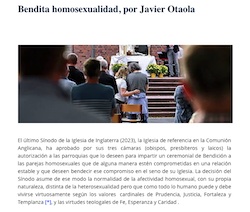Commenting on the decision of other national churches would be “disrespectful”, says Bishop Carlos Lopez of the IERE.
 Carlos Lopez, bishop of the IERE, the Anglican Church in Spain. / Youtube Catedral Anglicana Madrid
Carlos Lopez, bishop of the IERE, the Anglican Church in Spain. / Youtube Catedral Anglicana Madrid
The bishop of the Anglican Church in Spain believes that the Church of England’s decision to bless same-sex unions will not lead to a “rupture within the Anglican Communion”.
Carlos Lopez Lozano, bishop of the Spanish Reformed Episcopal Church (IERE in Spanish), has explained the church he leads has not taken “any decision regarding the blessing of same-sex couples”.
Inside the Anglican Communion, “the national churches are independent”, continued López in answers to Spanish news website Protestante Digital, therefore “the decisions of some are not binding for the others”.
The diverse views inside the Anglican Communion in relation to its understanding of sexuality have provoked a wide debate throughout the Anglican world. Recently, the Church of England - led by the Archbishop of Canterbury, Justin Welby - has approved giving ecclesiastical blessing to homosexual unions, though without marrying them.
The English Anglican Synod approved maintaining the special status of marriage as a union exclusively between a man and a woman, but at the same time recognised the bonds of love and fidelity between people of the same sex that can be received by the church with a blessing. The decision has led to some evangelical parishes to cut ties with the Church of England leadership.
Other Anglican Churches, those encompassed in the Global South movement, rtesponded to the move saying they “can no longer recognise the current Archbishop of Canterbury, the Most Revd Justin Welby, as the 'first among equals' of the global Communion”.
“As much as the Primates also wish to maintain the unity of the visible Church and the fabric of the Anglican Communion, our calling to be ‘a holy remnant’ does not allow us to be in communion with those provinces that have turned away from the historic faith and taken the path of false teaching”, they warned.
The communiqué from these churches did not merit an assessment by Carlos López either. Asked about it, the Spanish Anglican bishop emphasised that “the different churches of the Anglican Communion are totally independent in their decision-making” and “it would be disrespectful for one church to comment on the decisions of another or other churches. The policy of our church in Spain is not to comment on the decisions of other churches or provinces of the Anglican Communion”.
For Bishop Carlos Lopez, this situation does not necessarily lead to a rupture in the Anglican Communion. “We have been hearing for years from people and institutions outside the Anglican Communion [about the] immediate rupture, however, within the Anglican Communion we know that there are instruments of unity that help us to be together, even if in some aspects we have different opinions or positions”, he concluded.
[analysis][title] Director of Spanish Anglican magazine: “Blessed homosexuality”[/title][photo] 
[/photo][text]Meanwhile, the Anglican reference magazine in Spain, La Luz – Escritorio Anglicano (The Light - Anglican Desk), has recently published in its digital edition an article by its director, Javier Otaola, in which he welcomed the decision taken by the Church of England to bless homosexuality, an article that has also been republished in the religion news website Religión Digital.
Otaola writes (translated from Spanish):
“The decision of the Church of England does not compromise the Spanish Reformed Episcopal Church, which as a national Church is autonomous, but in my opinion, it means a huge change of perspective that goes far beyond the strictly ecclesiastical. It means nothing more and nothing less than that one of the apostolic Churches, referential for a universal Anglican Communion, blesses with all the healing power of that word a sexual condition that has been cursed a thousand times in the course of history, that injustice is now rectified - Urbi et Orbi - by radically rejecting the homophobic discourses which, based above all on the Old Testament, have cruelly nourished an ontological and hateful aversion against homosexual and bisexual men and women, persons or behaviour, which has resulted in discriminatory and sometimes criminal laws, actions and gestures”.
Otaola goes on to write that “in the classical and Greco-Latin tradition, tacitly assumed by the Church of England itself, homosexual affections and relationships are considered as a ‘particular friendship’ to which the dignity of any other personal affection can be recognised and which can be lived with full humanity. Speaking of this dignity proper and characteristic of that particular friendship, I am reminded of the beautiful words of Michel de Montaigne on the death of his essential friend, Etienne de la Boetie: ‘If I compare all the rest of my life with the four years that it was given me to enjoy the sweet company and society of that person, it is but smoke, it is but a dark and insipid night. Since the day I lost him I have done nothing but grovel and languish, and the very pleasures they offer me, instead of consoling me, make the value of his loss more acute. We went at everything by halves’. Blessed homosexuality”.
[/text][/analysis][donate]

Las opiniones vertidas por nuestros colaboradores se realizan a nivel personal, pudiendo coincidir o no con la postura de la dirección de Protestante Digital.
Si quieres comentar o